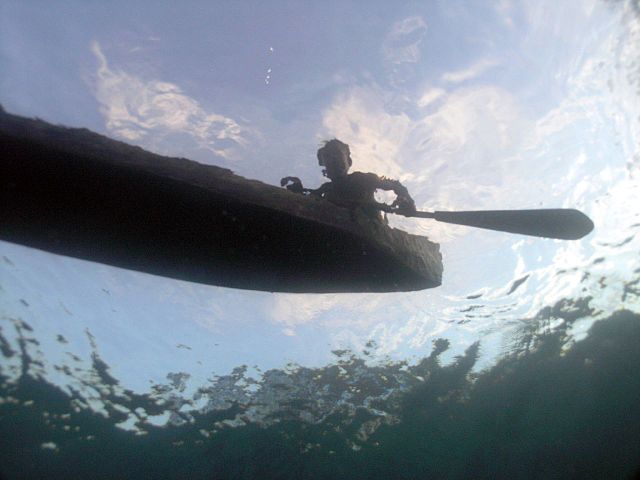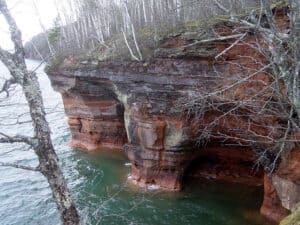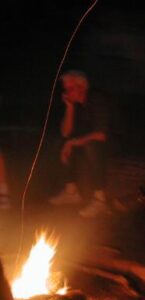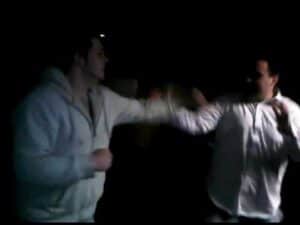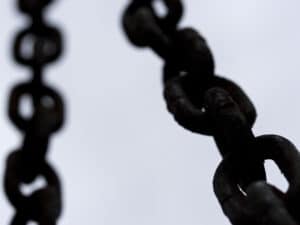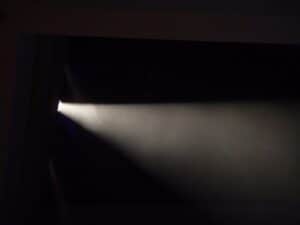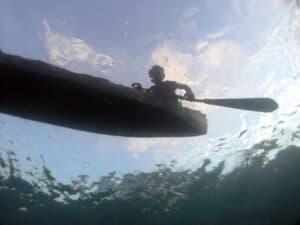
Jake said, “When you’re out there on Lake Superior in a canoe it’s like you’re in another world, like the way things used to be.”
Kaydan awoke in the middle of the night demanding Deet. I told him to go back to sleep, told him I was not his servant, which didn’t faze him. Kaydan was on a roll. Had been all night. Earlier he had been demanding Tom’s pup tent, the tent Tom had taken out of mothballs, his grandfather’s tent, smelling of mildew and naphthalene, which had been on the ground in Korea in ’52 – or so Tom claimed.
Kaydan didn’t care. He wanted it for a stabbin’ cabin, was willing to trade weed for it. Had seen a girl at the convenience store in Bayfield that he was convinced was a sure thing.
Tom only laughed, his low, breathy laugh, most of it coming through his nose. Tom preferred his own weed, which Kaydan called ditch weed and scorned. Tom didn’t care. He was easygoing, a slim, rangy figure with a slow rolling accent like one of those cowboys with a sprig of wheat between his teeth. It was hard to work him up into any kind of an emotion.
Kaydan groaned that the mosquitoes were eating him up. As I had done so many times in the past, I gave in and gave him what he wanted. Tom was serene, snoring away in his canvas tent, keeping the black bears away with his apnea, untroubled by insects.
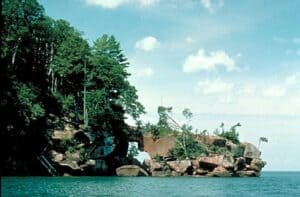
Even in the dead middle of summer, the waters of Lake Superior are frigid. You don’t want to fall in.
In the morning Jake gave Tom unrelenting shit about his snoring, told him he sounded like a damned winch. Jake knew Tom because Gordon had invited him over to the house a few times to watch football. Tom was an employee at Gordon’s company, drove the delivery truck but had good connections everywhere, could get weed, blow, tickets to Blackhawks games, and most importantly, tickets to Oprah, which Gordon’s wife coveted. Twice Tom had done this. In Gordon’s house Tom was golden.
But Gordon rarely spoke of his wife. It was peculiar the way he avoided speaking of her. Kaydan harassed him about it, but Jake told him to shut up and keep paddling. That’s when they were together in the canoe, right before they flipped over and Kaydan nearly died of hypothermia; the waters up around the Apostle Islands are frigid, even in the middle of summer.
But of course Kaydan was overreacting again. He was about as far from hypothermia as Gordon was from talking about his wife. He couldn’t be drawn out about her. But he was more than willing to trumpet about his kids. Like so many suburban parents, Gordon couldn’t resist droning on about his kids, soccer matches, ballet recitals, academic achievements. The rest of us looked at each other across the campfire with weary expressions.
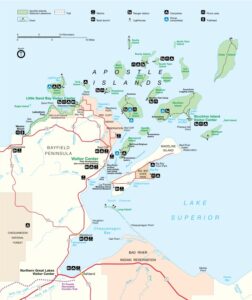
The Apostle Islands lie at the northernmost point of Wisconsin, clustered at the southwest end of Lake Superior.
Fortunately right about then the yahoos from Fond du Lac – or someplace around there, as we eventually came to understand – came roaring into the campground, whooping and hollering. They pulled into the next campsite and jumped out of the bed off their pickup like an invading army, guzzling cans of Miller, pounding their chests, shoving and sparring. We didn’t go over to greet them. But we were glad they had silenced Gordon.
Entering Choppy Waters
Gordon had put this trip together. It was his brainchild. Later he told me he had done it to get away from home. He decided to call on some of his closest friends, his old college buddies, which consisted of Kaydan and I, and his loyal employee, Tom, and his next door neighbor, Jake. “Let’s go the Apostle Islands and do some canoeing,” he said, and so we did.
The Apostle Islands lie at the northernmost point of Wisconsin, clustered at the southwest end of Lake Superior, some eight hours north of Chicago. They are a group of 22 islands spread over 400 square miles. They are particularly noted for their dramatic sea caves and unfettered wildlife. Jake had been here before and particularly recommended it as a getaway. “When you’re out there on Lake Superior in a canoe it’s like you’re in another world, like the way things used to be.”
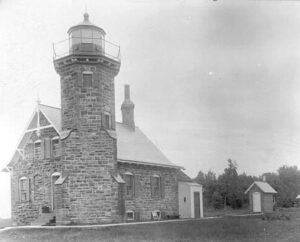
We had been paddling for over an hour before we even raised the brown brick lighthouse on Sand Island. Devil’s Island was another ten miles off.
Jake was a natural prep, born to wear a letter jacket, captain of somebody’s football team somewhere, but gone to fat now, a perforated authentic jersey riding up over a couple of spare tires, a dollop of hair whipped to a froth like Big Boy or Ronald Reagan, a confident believer in a better past. It was Jake who first told me what was going on. “His wife’s having affair,” he said. “It’s driving him nuts. He thinks it’s her tennis instructor. He found a pair of Bollé sunglasses on the nightstand.”
My heart went out to the poor devil. Such a crisis would hit a guy like Gordon harder than other guys. He had always been insecure about his looks; felt he had married over his head. At his wedding he told me he was just so grateful Ashley would have him. And then there was the family; it was deeply important to Gordon, raising kids, sharing values, building a cozy nest everyone could come home to.
That morning as we took the canoes off the trailer I wanted to reach out to him, to tell him that I was there for him, no matter what. He could depend on me. But he was short-tempered, hadn’t slept well. The guys at the next campsite had kept him up all night, playing poker and laughing at the tops of their lungs. Campground security came at 2am and told them to keep it down, but they started up again as soon as they were gone. Kaydan slept through it all. Once he got his Deet he was out like a light. In the morning he was rarin’ to go. He insisted on sitting in the stern and doing all the paddling. He said he felt mighty, like an Indian warrior.
There were five of us and only two canoes. One boat had to have three people in it, and the guy in the middle didn’t have much to do. Tom sat in the middle. Kaydan and I were the paddlers. Gordon and Jake took the other boat. We set off across Little Sand Bay toward the sea caves on Devil’s Island. It was a long way. We had been paddling for over an hour before we even raised the brown brick lighthouse on Sand Island. Devil’s Island was another two miles off.
The lake was surprisingly choppy with a head wind. At this rate it would take another hour to get to Devil’s Island. Kaydan was for turning back; he said it was ridiculous, especially when there were perfectly good caves to be explored nearer by. He said he felt like his arms were falling off. Silently, without a word of complaint, Tom took over the paddling. Kaydan lay down in the hull and fell sleep. Our Indian warrior. Uh, yup.
A Devil Among the Apostles
It did take an agonizingly long time to get to Devil’s Island, but it was worth the trip. The caves were magical, sandstone grottoes honeycombed into the rock with hobbit-like rusticity. The cliffs were bristling with spruce and cedar. Gulls swooped and wheeled overhead.
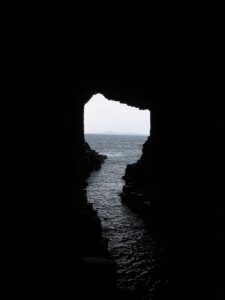
We paddled around inside the caves. I had a premonition of something dark and tragic about to unfold.
We paddled around in the caves, ate some sandwiches, drank some beers, and when we came out, the sun was full up. Tom slipped on his sunglasses. The word Bollé was printed on the side.
The trip back went a lot faster. We had a tailwind and got back to the mainland before 6pm. Since it was midsummer there was still a good three hours of sunlight but we were all exhausted, all except for Kaydan who spotted some girls he had seen at the campground and insisted on showing off by standing on the gunwales of the canoe and rocking it back and forth in an attempt to propel it forward in that manner.
He slipped and fell on his back in the hull, scraping his elbow on the crossbeam. Jake and I roared at his antics. Gordon said it served him right. The girls snickered behind their hands; they looked like Native-American girls from the Chippewa reservation.
On the way back to the campground Tom struggled to get reception on his cell phone. It was one of those old models, about the size of a brick. Tom didn’t make much money as a delivery driver for Gordon’s company and probably couldn’t afford a newer phone, so I took pity on him and lent him mine. He went off by himself and talked for some time. When he came back, he looked a little vexed.
Tom, Jake and Kaydan went down to the lakeshore to smoke a joint, and I helped Gordon build a fire. Once we had it stoked and crackling, we sat down and opened some beers. I asked Gordon how he was doing. He sat with his chin in his hand, staring into the flames. Eventually he opened up and told me he was having problems at home. Then my phone rang. Gordon gestured for me to answer it. I wished I hadn’t.
“Hello, Tom. Is that you?” It was a woman’s voice. “Listen, I’m sorry. It’s just that it’s reckless. You shouldn’t have done that. If you’d have just said no, he wouldn’t have suspected anything.”
I pulled the phone away from my ear and looked at it. The call was coming from Gordon’s house. My heart sank. I put the phone back to my ear. Now the voice sounded worried, anxious. “Tom, is that you? Tom?”
I said hello. The woman hung up.
I looked across the campfire at Gordon. “Who was it?” he asked.
“Wrong number.”
Gordon shrugged. “Anyway,” he said, picking up where the conversation had left off. “It’s her tennis instructor. I’m sure of it.”
The other guys were coming back. Now was not the time. The conversation turned to other things.
Harmony Interrupted
As dusk gathered I couldn’t help looking at Tom and wondering how he could do this to a friend. Did he secretly hate him? Maybe he resented him for being his superior at work. Maybe this was a way to assert power over him, to diminish him. It was ugly sometimes what guys would do to other guys to get the upper hand.
Kaydan had gone off somewhere, probably to take a leak, but he was gone longer than expected and when he came back he had the two girls from the canoe launch with him. He introduced them. They were pretty girls, slender with high cheekbones and long straight black hair. They couldn’t have been more than seventeen.
They confirmed what I had suspected. They were Chippewas from the Red Cliff Reservation. They told us the campground was on tribal land. They teased us about being squatters. They said the name of the lake in Ojibwa was Gitchee Gumee and they sang the song by Gordon Lightfoot that refers to it as such, doing a pretty tolerable job of harmonizing.
While they were singing, the yahoos from the neighboring campsite came roaring back in their pick up, whooping and hollering. They had clearly been on a bender somewhere. They heard the girls singing and mocked them. They cranked up their radios to drown them out. When the girls got up to go, they saw they were Native-Americans and began flinging insults at them, calling them “chugs” and “bushniggers”. It was so utterly over the top and unnecessary we were shocked. Kaydan half-heartedly told them to shut up, but I don’t think they heard him. The girls excused themselves and hurried off, bowing their heads, as if being pelted by a slanting rain.
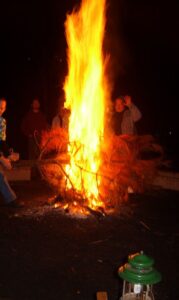
The rowdies had managed to stoke a considerable fire and were carrying on around it, ignoring the security patrol.
“We should go over there and say something to them,” suggested Gordon.
“They’re drunk,” said Jake. “Besides, they outnumber us.”
We sat there in gloomy silence for awhile. Meanwhile, our neighbors kept it up. Finally Tom announced he was going to get security. Gordon said he would go with him, that he couldn’t spend another sleepless night with those guys making all that noise.
By the time they got back it was full dark. Night in those parts is black, and Tom and Gordon had gone off quickly and forgotten the flashlight. On the way back, Tom had collided with a tree, and Gordon couldn’t stop laughing about it. Tom showed us the scrape on his forehead. “Gordon shoved me,” he said, and Gordon admitted he had stumbled into him. “You can’t see your hand in front of your face out there.”
Just then security rolled up in two jeeps and shone their headlights on our neighbors’ campsite. Their intrusion didn’t seem to faze the rowdies who had managed to stoke a considerable fire and were standing in its rippling glow, ignoring them. The security detail got out and confronted them. There were two of them, both Native-Americans. The girls had been right, the campground was on tribal land. A heated conversation ensued. Finally the security guards drove off under a barrage of insults.
“A lot of good that did,” said Kaydan.
“They’re going to get the cops,” said Gordon. But he was wrong.
Like a Swarm of Wasps
The party roared on. Eventually we went into our tents and tried to get some sleep, but it was impossible. Even Kaydan couldn’t doze off. Finally we heard the zipper going up on Gordon’s tent. By the time we got to our flaps, he was already on his way over there. I looked at my watch. It was 3am.
“This is not good,” I said to Kaydan.
Then we heard Tom emerging from his tent. A moment later his lanky figure appeared against the firelight, going in pursuit of his employer. Reluctantly, we pulled on our jeans and stood up just in time to see an altercation developing between Gordon and two of our neighbors.
Gordon had been shoved. He staggered back a few steps, seething, and charged, head down, into them. Tom arrived just in time to add momentum. Together they plowed into the surprised rowdies, knocking them off their feet and sending them sprawling. This brought the remaining bystanders down on them like a swarm of wasps.
Now there was no question; we had to get involved. We rushed over and were about to wade in when the sound of arriving vehicles made us stop and look back. Cars and trucks fetched up helter skelter before the campfire, their wheels grinding to a halt in the dust, their headlights blinding us. Kaydan and I drifted back, receding into the darkness; the last thing we needed now was to be arrested for something we hadn’t wanted to be part of.
But the newcomers weren’t cops. They were men of all shapes and sizes, dressed in flannel shirts and work boots. They were carrying chains and baseball bats, and they went to work without hesitation, whipping the backs and shoulders of the rowdies, kicking them viciously in the ribs, breaking bones, smashing teeth in.
A few of the rowdies managed to get to their feet and put up a fight. They got the worst of it. They were bludgeoned and kicked so ferociously we were afraid we were witnessing murder.
Throwing Away the Chains
It was over as quickly as it had begun. The attackers got back in their vehicles and drove off. There were no license plate numbers. All the vehicles were older models, showing rust. One had a driver side door of a different color.
Back at the tents, Jake confronted us, demanding to know what had happened. Shaken, I groped around until I found a flashlight. Then I returned to the scene of the carnage. The music coming from one of the truck was still blaring. I reached in and turned it off.
I shone the flashlight around the campsite. Bodies were strewn everywhere, some writhing in agony, some groaning, a few lying perfectly still.
I found Gordon by the fringe of the forest, sitting cross-legged, with a chain in each hand. He had picked them up to defend himself, he said. He held them up to me. “Throw them away,” he said in disgust.
His lip was swollen and he had a nasty cut over his eye but otherwise he was none the worse for wear. He told me he had managed to crawl away when the Indians had shown up. That’s how he referred to them, the Indians. “Native-Americans,” I corrected him. “Okay,” he said.
We found Tom face down by the campfire. He had been worked over pretty good. We tried to bring him around but he was groggy. “We better not move him. Let’s wait for the ambulance,” I said.
When the ambulances came, Gordon refused treatment, insisting he was all right and directing the medical technicians to see to his friend. They carted Tom off, along with four of the wounded rowdies. We packed up our gear and followed.
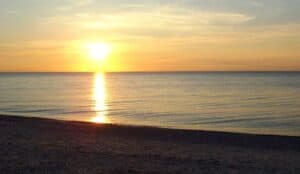
For some people the Apostle Islands are the most beautful place in the world, but for me the place resonates with a different meaning.
In the waiting room the cops showed up and wanted to know what had happened. I told them what I had seen. I had nothing to hide. When they asked for a description of the vehicles I told them there was nothing to go on. One car had a green door, I said. They asked if the attackers were Native-Americans. “Hard to say,” I said.
Tom had a severe concussion and some broken ribs. He had been lashed mercilessly with a chain. He was going to have to remain in the hospital for a few days. Gordon vowed to stay with him. The rest of us drove home.
I didn’t see Gordon after that. Months went by. We drifted apart. A few years later I heard he had gotten a divorce. Kaydan had started a company selling rare sports collectibles. He was doing all right until the recession hit. Then he lost everything.
I never saw Jake or Tom again. Traumatic events like that have a tendency to blow tenuous relationships apart.
Now whenever I think of the Apostle Islands I get an uneasy feeling. I know it has nothing to do with the place itself. For some people the Apostle Islands are the most beautiful place in the world. But for me the shores of Gitchee Gumee resonate with a different meaning, a reminder of what some men are willing to do to be on top, and what other men are willing to do to fight their way back.
Check it out…
Camping in the Apostle Islands
Apostle Islands National Lakeshore
Campsite Directory
National Park Service
715-779-3397
Apostle Island Kayak Rentals
690 Main Street
La Pointe, WI 54850
715 747-3636
Previous stop on the odyssey: The Field of Dreams, IA //
Next stop on the odyssey: Ely, MN
Image Credits:
Canoe From Underneath, Mjwinoz; Raspberry Island, Public Domain; Apostle Island Map, Public Domain; Sand Island Light House, Public Domain; Squaw Island Sea Cave, Bobak He’Eri; Staring into the fire, people.hws.edu; Headlights, AndreasF ; A Considerable Fire, Lee ; Brawl, Matt Shank; Chains, Mschel; Flashlight beam, Public Domain; Lake Superior, Stanthejeep

